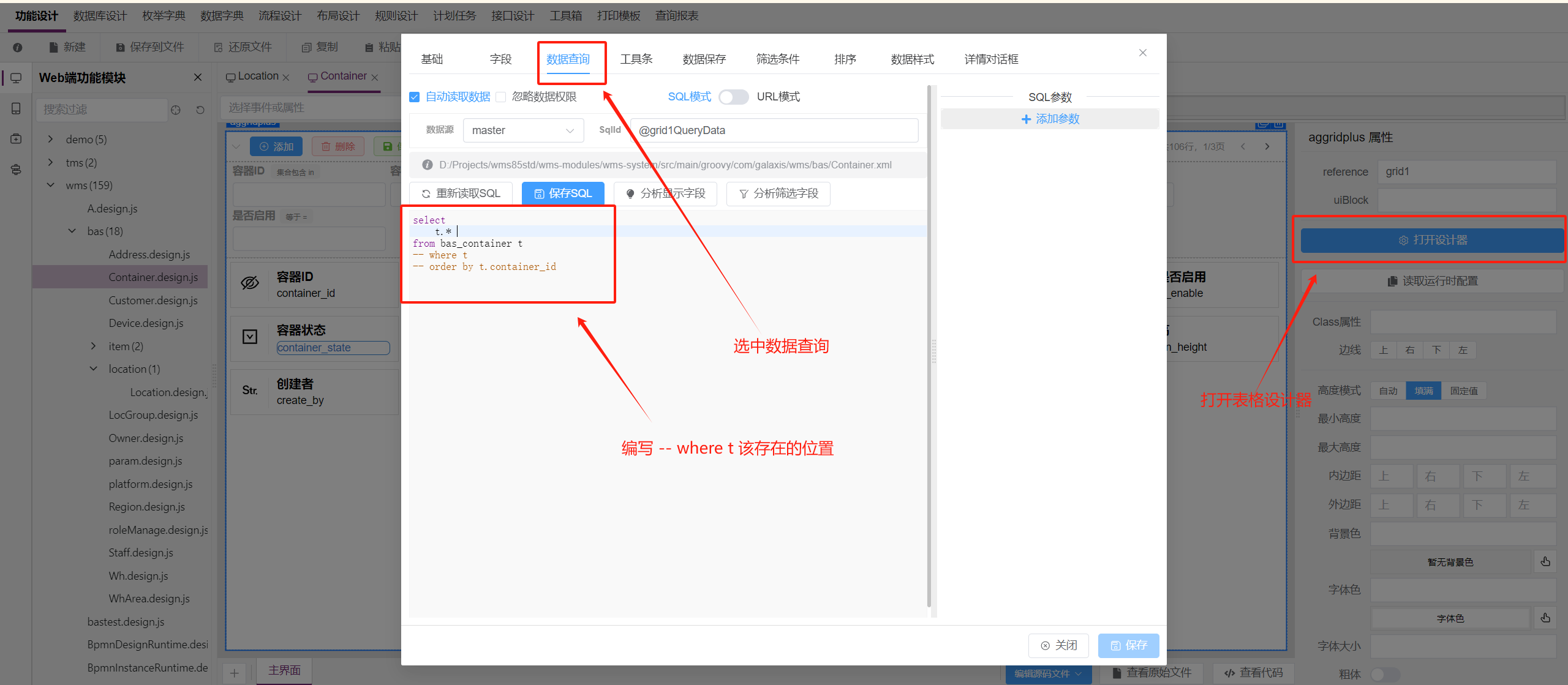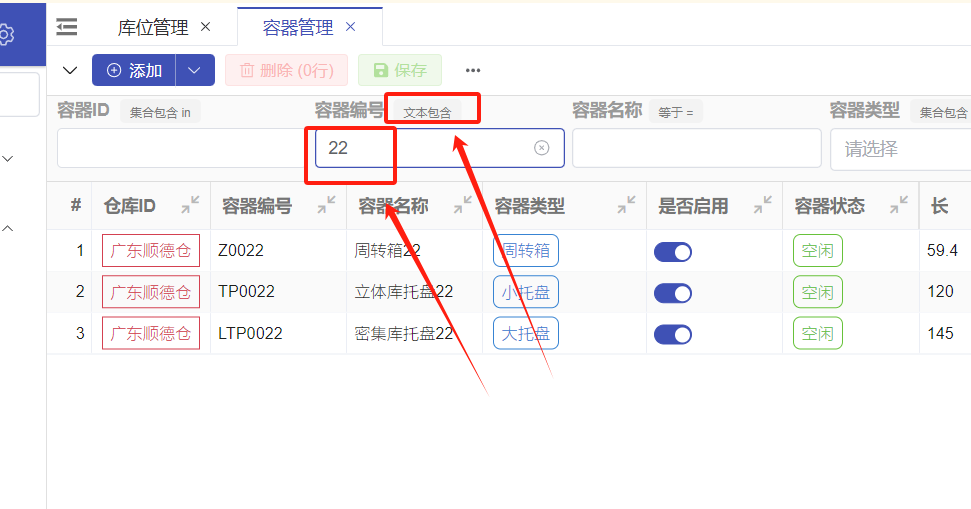深浅模式
MyBatis框架特性
二开平台中的查询语句都是 MyBatis 语法, 下面介绍,框架中独特支持的语法糖
语法糖 --@
- --@ 用于判断变量是否有值,有值的情况下才附带 "=" 等值语句, 比如:
<#if test="loc_code != null && loc_code != ''">
and loc.loc_code = #{loc_code}
</#if>
语法糖写法:
--@ and loc.loc_code = #{loc_code}- --@ 只能适用于后面只带一个变量的情况,如果有多个变量,不适用
- 综合示例
sql
select
loc.* ,
wh.wh_name,
region.region_name,
wh_area.wh_area_name
from bas_location loc
left join bas_wh wh on wh.wh_id = loc.wh_id
left join bas_wh_area wh_area on wh_area.wh_area_id = loc.wh_area_id
left join bas_region region on region.region_id = loc.region_id
<where>
--@ wh_area.wh_area_id = #{wh_area_id, javaType=long}
--@ loc.loc_code = #{loc_code}
--@ loc.road_code = #{road_code}
--@ loc.row_no = #{row_no}
--@ loc.column_no = #{column_no}
--@ loc.cno = #{cno}
</where>
order by loc.loc_id语法糖 --%
- --% 用于判断变量是否有值,有值的情况下附带字符串 like 语句, 比如:
<#if test="loc_code != null && loc_code != ''">
and loc.loc_code like '%' + #{loc_code} + '%'
</#if>
语法糖写法:
--% and loc.loc_code like #{loc_code}- 综合示例
sql
SELECT
a.owner_id,
a.owner_code,
a.owner_name,
a.logogram,
a.contact,
a.telephone,
a.province,
a.city,
a.zip,
a.address,
a.remark,
a.is_default_owner,
a.is_enable
FROM bas_owner a
WHERE
a.is_enable = '0001'
--@ and a.onwer_id = #{onwer_id, javaType=long}
--% and a.onwer_code like #{onwer_code}
--% and a.onwer_name like #{onwer_name}语法糖 --where
- --<空格>where 是筛选条件占位符
- 用于在表格筛选条件中,生成 where 条件
- 比如: SQL语句设置

sql
select
t.*
from bas_container t
-- where t客户端筛选条件

框架自动根据前端筛选条件,生成SQL语句
sql
SELECT
t.*
FROM bas_container t
WHERE
t.container_code LIKE '%22%'- 当有多张表的情况下,需要都加上, 比如
sql
select
t.*,
t1.*,
t2.*,
t3.*,
t4.*
from gsp_quality_review_supply t
left join bas_item t1 on t1.item_id=t.item_id
left join inv_lot_att t2 on t2.lot_id=t.lot_id
left join bas_package t3 on t3.pack_id=t2.pack_id
left join bas_package_items t4 on t4.pack_id=t2.pack_id and t4.pack_level='0001'
-- where t,t1,t2,t3,t4语法糖 --i
- --i 用于判断变量是否有值,有值的情况下用 foreach 判断集合 in : 语法糖写法
SQL
select * from sys_app where is_enable='0001'
--i and app_key in #{appKeys}数据
json
{
"appKeys": [
"tms",
"wms"
]
}转换后的SQL
SQL
select * from sys_app where is_enable='0001'
and app_key in ('tms','wms')- 带类型也同样适用
SQL
select * from bas_item t where t.is_enable='0001'
--i and t.item_id in #{appKeys, javaType=long}多值 in 情况
语法糖写法
SQL
select * from bas_package_items t where t.is_enable='0001'
--i and (t.item_id, t.pack_level) in #{appKeys} (#{.id, javaType=long}, #{.level})数据是
json
{
"appKeys": [
{
"id": 433050315521925957,
"level": "0001"
},
{
"id": 433050315521925957,
"level": "0003"
},
{
"id": 433050327660241734,
"level": "0001"
},
{
"id": 433050327660241734,
"level": "0002"
}
]
}转换后的SQL
SQL
select * from bas_package_items t where t.is_enable='0001'
and (t.item_id, t.pack_level) in (
(433050315521925957, '0001'),
(433050315521925957, '0003'),
(433050327660241734, '0001'),
(433050327660241734, '0002')
)语法糖 --#
- --# 叫字段替代占位符
- 只能用在二开中的 "数据字典" 定义中
- 用于基于数据字典的ID/Text翻译特性,比如:

- 数据窗口的SQL内容
sql
select
u.user_id,
u.user_code,
u.user_name,
u.is_enable,
u.org_id,
u.staff_no,
a.login_id
from bas_login_agent a
inner join bas_user u on a.user_id=u.user_id
--# and a.#- 实际转换后的效果
sql
select
a.login_id as code
u.user_name as text
from bas_login_agent a
inner join bas_user u on a.user_id=u.user_id
and a.login_id in (10001,10002,10003)- 综合示例
sql
select
bc.customer_id,
bc.customer_code,
bc.custom_type,
bc.customer_name,
bc.address,
bc.remark,
bc.is_enable,
bc.create_by,
bc.update_by,
bc.create_at,
bc.update_at
from bas_customer bc
where
bc.is_enable = '0001'
--@ and bc.custom_type = #{custom_type}
${@com.galaxis.wms.ext.Sql@phrase('AND', 'bc.customer_name like', 'bc.customer_code like')}
--# and bc.#
order by bc.customer_id短句查询 phrase
- 短句查询只能用在二开中的 "数据字典" 定义中
- 短句查询,是指某个字符串,在多个字段做匹配(有的字段是 like ,有的字段用 = )
- 必须全部包含,且可以跨字段匹配
- 语法是: com.galaxis.wms.ext.Sql@phrase('AND', '字段1', '字段2' ...) 比如,搜索: 0001 sp1 如果配上 com.galaxis.wms.ext.Sql@phrase('AND', 'a.item_code like', 'a.item_id')
生成的sql就是
sql
and (a.item_code like '%0001%' or a.item_id = '0001')
and (a.item_code like '%sp1%' or a.item_id = 'sp1')use_raw_sql 忽略数据权限
在系统框架中,如果查询的第一张表带有 wh_id / owner_id 字段,会自动加上数据权限的过滤条件。比如
sql
SELECT t.* FROM bas_customer t系统会自动加上
sql
SELECT t.* FROM bas_customer t
WHERE t.owner_id IN (101)如果要忽略这个特性,可以在SQL语句的第一行加上 --use_raw_sql
sql
--use_raw_sql
SELECT a.owner_id, a.owner_code, a.owner_name, a.logogram, a.contact, a.telephone, a.province, a.city, a.zip,
a.address,
a.remark, a.is_default_owner, a.is_enable
FROM bas_owner a
WHERE a.is_enable = '0001'或者在 JAVA 中禁用 SQL 重写
java
import com.galaxis.wms.ext.SQLRewriteHolder;
try {
SQLRewriteHolder.disable();
} finally {
SQLRewriteHolder.enable();
} }
- 综合示例
```sql
SELECT
item_id,
owner_id,
item_code,
item_name,
logogram,
item_desc,
is_enable
FROM bas_item
<where>
--@ and item_id = #{item_id, javaType=long}
--% and item_name like #{item_name}
${@com.galaxis.wms.ext.Sql@phrase('AND', 'item_code like', 'item_name like', 'logogram like')}
--# and bas_item.#
</where>MyBatis常规语法
foreach
xml
<if test="status != null">
and status in
<foreach item="item" collection="status" separator="," open="(" close=")" index="index">
#{item, jdbcType=TINYINT}
</foreach>
</if>if
xml
<if test="subjectNo != null and subjectNo != '' ">
and subject_no = #{subjectNo,jdbcType=VARCHAR}
</if>choose
xml
<choose>
<!-- 周 -->
<when test="dateType == 'WEEK' ">
concat(DATE_FORMAT(statistic_time ,'%X-%V'),'(周)') as statisticTime,
</when>
<!-- 月 -->
<when test="dateType == 'MONTH' ">
DATE_FORMAT(statistic_time ,'%Y-%m') as statisticTime,
</when>
<!-- 年 -->
<when test="dateType == 'YEAR' ">
DATE_FORMAT(statistic_time ,'%Y') as statisticTime,
</when>
<!-- 默认 日 -->
<otherwise>
DATE_FORMAT(statistic_time ,'%Y-%m-%d') as statisticTime,
</otherwise>
</choose>insert
xml
<insert id="itemPublish" parameterType="item" useGeneratedKeys="true" keyProperty="id">
insert into item (platform_id, seller_id,
shop_id, supply_seller_id, supply_shop_id, operator_id,
item_name, cid,second_cid, brand_id,
unit, origin, ad,
category_attributes, spec_attributes, sale_status,
packing_list, describe_url, created,
modified, shop_cid, listing_time,
delisting_time, operator,
add_source, store_status, yn,copy_status,publishuserId,industry_label,
cash_coupon_support,meet_coupon_support,vip_discount_support,detail_page_qrcode
)
values ( #{platformId,jdbcType=BIGINT}, #{sellerId,jdbcType=BIGINT},
#{shopId,jdbcType=BIGINT}, #{supplySellerId,jdbcType=BIGINT}, #{supplyShopId,jdbcType=BIGINT}, #{operatorId,jdbcType=INTEGER},
#{itemName,jdbcType=VARCHAR}, #{cid,jdbcType=BIGINT},#{secondCid}, #{brandId,jdbcType=BIGINT},
#{unit,jdbcType=VARCHAR}, #{origin,jdbcType=VARCHAR}, #{ad,jdbcType=VARCHAR},
#{categoryAttributes,jdbcType=VARCHAR}, #{specAttributes,jdbcType=VARCHAR}, #{saleStatus,jdbcType=INTEGER},
#{packingList,jdbcType=VARCHAR}, #{describeUrl,jdbcType=VARCHAR}, now(),
now(),#{shopCid,jdbcType=BIGINT},#{listingTime,jdbcType=TIMESTAMP},
#{delistingTime,jdbcType=TIMESTAMP}, #{operator,jdbcType=INTEGER},
#{addSource,jdbcType=INTEGER},#{storeStatus,jdbcType=INTEGER},1,#{copyStatus,jdbcType=INTEGER}, #{publishuserId,jdbcType=BIGINT},#{industryLabel,jdbcType=VARCHAR},
#{cashCouponSupport,jdbcType=INTEGER},#{meetCouponSupport,jdbcType=INTEGER},#{vipDiscountSupport,jdbcType=INTEGER},#{detailPageQrcode,jdbcType=VARCHAR}
)
</insert>update
xml
<update id="updateSaleStatus" parameterType="map">
UPDATE item
<set>
store_status = #{storeStatus},
<if test="saleStatus != null">
sale_status = #{saleStatus}
</if>
</set>
WHERE id = #{itemId}
AND platform_id = #{platformId}
</update>
<update id="updateItem" parameterType="itemPublish">
update item set
operator_id=#{operatorId,jdbcType=INTEGER},item_name=#{itemName,jdbcType=VARCHAR},cid=#{cid,jdbcType=BIGINT},second_cid=#{secondCid},brand_id=#{brandId,jdbcType=BIGINT},
unit=#{unit,jdbcType=VARCHAR},origin=#{origin,jdbcType=VARCHAR},ad=#{ad,jdbcType=VARCHAR},category_attributes=#{categoryAttributes,jdbcType=VARCHAR},
spec_attributes=#{specAttributes,jdbcType=VARCHAR},sale_status=#{saleStatus},store_status = #{storeStatus},
packing_list=#{packingList,jdbcType=VARCHAR},describe_url=#{describeUrl,jdbcType=VARCHAR},shop_cid=#{shopCid,jdbcType=BIGINT},
operator=#{operator,jdbcType=INTEGER},industry_label=#{industryLabel},
cash_coupon_support=#{cashCouponSupport},meet_coupon_support=#{meetCouponSupport},vip_discount_support=#{vipDiscountSupport}
<if test="publishuserId != null">
,publishuserId=#{publishuserId}
</if>
where id=#{id,jdbcType=BIGINT} and platform_id=#{platformId} and yn=1
</update>select
xml
<select id="queryItems" parameterType="sellSupplyItemInfoVo" resultMap="SellSupplyItemMap">
select DISTINCT i.id itemId,i.platform_id, i.item_name, sii.supply_seller_id, sii.supply_shop_id,ip.picture_url,
category.cname1, category.cname2, category.cname3, category.cname4
from shop_item_library sii
JOIN item i
on sii.item_id=i.id
and i.store_status = 30
and sii.supply_status = 0
JOIN item_picture ip
on i.id = ip.item_id
LEFT JOIN item_sku isk
on i.id = isk.item_id
LEFT JOIN item_brand ib
on i.brand_id = ib.id
JOIN
(
SELECT c4.c_name cname1,c3.c_name cname2,c2.c_name cname3,c1.c_name cname4,c1.cid cid
FROM item_category c1
LEFT JOIN item_category c2 ON c1.parent_cid = c2.cid
LEFT JOIN item_category c3 ON c2.parent_cid = c3.cid
LEFT JOIN item_category c4 ON c3.parent_cid = c4.cid
WHERE
c1.platform_id = #{platformId}
<if test="cid != null and cid != ''">
And c1.cid= #{cid}
</if>
) category ON i.cid = category.cid
where sii.supply_seller_id = #{supplySellerId}
AND i.platform_id = #{platformId}
<if test="productCode != null and productCode != ''">
AND isk.product_code LIKE CONCAT('%', #{productCode},'%' )
</if>
<if test="modelCode != null and modelCode != ''">
AND isk.model_code LIKE CONCAT('%', #{modelCode},'%' )
</if>
<if test="itemName != null and itemName != ''">
AND i.item_name LIKE CONCAT('%', #{itemName},'%' )
</if>
</select>
<select id="selectByExample" resultMap="BaseResultMap" parameterType="com....ItemImportExample" >
select
<if test="distinct" >
distinct
</if>
'true' as QUERYID,
<include refid="Base_Column_List" />
from item_import_tmp
<if test="_parameter != null" >
<include refid="Example_Where_Clause" />
</if>
<if test="orderByClause != null" >
order by ${orderByClause}
</if>
</select>